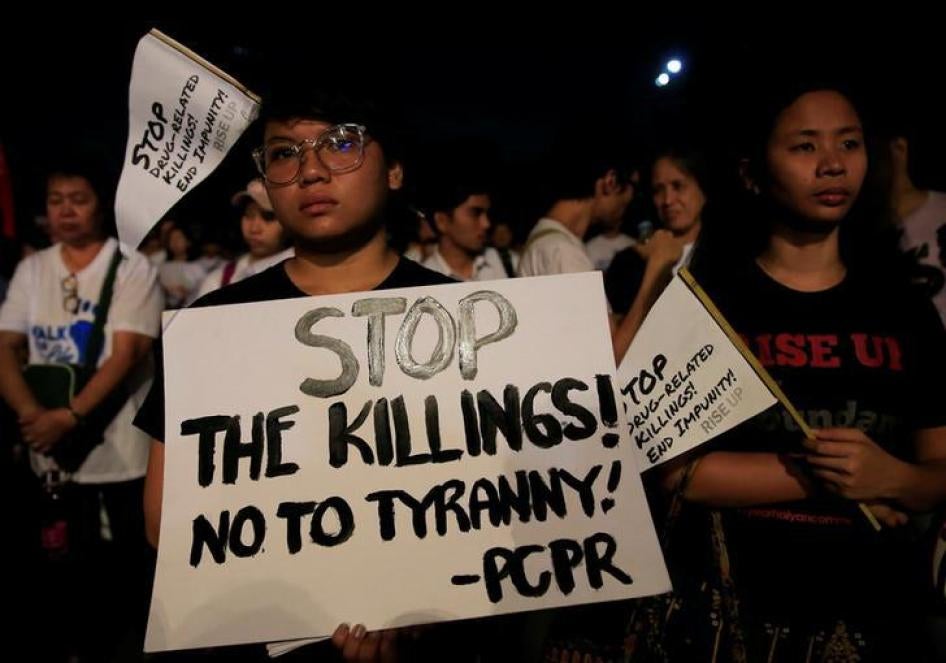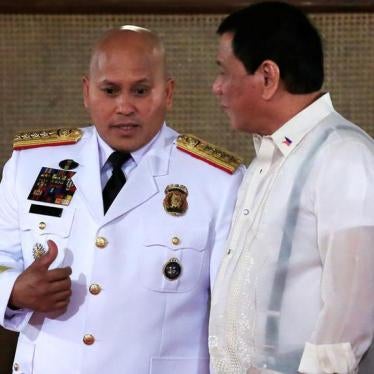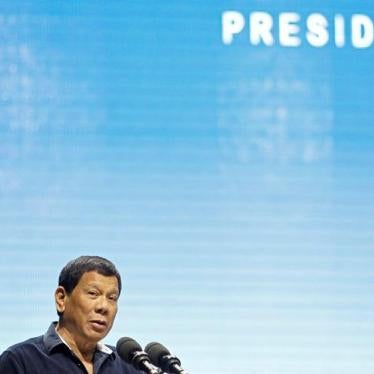The new Netflix drama series Amo, inspired by the Philippine government’s real-life “war on drugs,” presents a sinister revisionist take on an ongoing human-rights calamity.
Amo’s Filipino director, Brillante Mendoza, has described the 13-episode miniseries, which began streaming last month, as a “true” depiction of the problem of illegal drugs in the Philippines and how “the government has really got very tough about it.”
But anyone familiar with President Rodrigo Duterte’s “drug war” will find little in Amo beyond corrupt police, which corresponds to the reality of the state-backed campaign of targeted killings that began in July 2016. The plot of Amo (which means “boss” in Tagalog) follows a teen drug mule caught up in a highly stylized Manila underworld populated by drug lords, sex workers, crooked cops and their hapless extended families.
Mendoza describes Amo as his attempt to “tell truthful stories” about Duterte’s anti-drug campaign. The series begins in gritty Manila back alleys, but quickly transitions to a milieu of upmarket nightclubs where well-heeled patrons are peddled Ecstasy alongside their cocktails. This is not the world of the real anti-drug campaign, which is characterized by summary executions by the police and their agents of urban slum dwellers, and to date has killed more than 12,000 people.
One of the most notably preposterous elements of Amo is that significant numbers of suspected drug users and dealers actually survive their encounters with the Philippine National Police, ending up under arrest and behind bars, awaiting justice. In the real Philippine drug war, suspected drug users and dealers typically end up as victims of often gruesome summary killings.
In Amo, the only unlawful killings by police are perpetrated by a small squad of corrupt cops whose sole victims are two foreign nationals suspected of illegal drug trafficking. Meanwhile their real-life police counterparts and their agents routinely summarily execute Filipino suspected drug users and dealers, plant drugs and weapons on the bodies and attribute those deaths to suspects who “fought back” during arrest.
The situation is so egregious that the International Criminal Court has begun a preliminary examination into the killings, and there is growing momentum inside the United Nations for a separate UN inquiry.
Numerous sequences in Amo appear to be deliberate efforts to reinforce the government’s counter-narrative to the anti-drug campaign’s scrupulously documented human-rights abuses. Police officers tell people whose names appear on barangay (neighborhood) drug watch lists that “If you’re not guilty of anything, your name will be cleared.”
But the reality left out of the series – which Human Rights Watch has documented – is that many such people end up victims of police killings.
In another scene, a police officer expresses concern about media’s and human-rights organizations’ scrutiny of the drug war; instead the Duterte government and the police have sought to harass, intimidate and impugn any agencies or individuals who demand accountability for the “drug war” slaughter.
Other sequences echo the Duterte government’s reaction to international criticism of the drug war as a smear campaign that is “deliberately misrepresenting” the scale of the killings to create an “unfair and unjust image” of the Philippines.
In one scene, a teen drug gang kills a suspected police informer and then pins a cardboard sign to his body that reads “I am a drug addict. Learn from me.” There have in fact been hundreds of instances in which the corpses of suspected drug users and dealers, riddled with bullets and stab wounds, were found with cardboard signs with similar messages attached to their bodies. Mendoza’s depiction of that outrage echoes government claims that such killings were committed by shadowy “vigilantes” with no connection to the police.
Mendoza has dismissed accusations that Amo makes him a willing propagandist for Duterte, for whom he has expressed admiration, by stating “I don’t care about politics.” Netflix likewise has sidestepped the political slant of Amo by billing it as a “bold and suspenseful show that has the potential of capturing thrill-seeking audiences worldwide.”
And Netflix certainly need not ensure that the fictional series on its platform are factually or historically accurate. But given the global interest in this issue – Reuters just won a Pulitzer Prize for its coverage of the Philippine drug war – it would be an invaluable public service if Netflix offered its subscribers a fact-based documentary. Viewers might find the truth a bit more enlightening – and disturbing – than the fiction.









